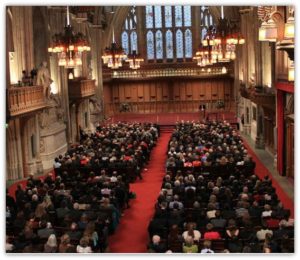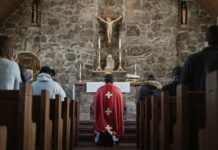 England’s Gresham College has a series of excellent lectures available for free on YouTube. Two grabbed my attention; Alister McGrath’s, ‘Darwin, Evolution and God: The Present Debates‘ and Alec Ryrie’s ‘What Would Jesus Do? Christian Culture Wars in the Modern West.’
England’s Gresham College has a series of excellent lectures available for free on YouTube. Two grabbed my attention; Alister McGrath’s, ‘Darwin, Evolution and God: The Present Debates‘ and Alec Ryrie’s ‘What Would Jesus Do? Christian Culture Wars in the Modern West.’
McGrath’s lecture starts with an overview of Charles Darwin’s journey from The Beagle to the establishment of his theory, and closes with a discussion about Darwinism and religion. My only criticism was that McGrath is a little too generous towards Darwin when discussing Nazism and its social Darwinian foundations.
That was however offset by McGrath’s in-depth look at Darwin’s assertions in ‘The Decent of Man’:
“Darwin never became an atheist. Although he wrestled with [Protestant] Christianity’s “lack” in dealing with suffering, brought on by the loss of his daughter, Darwin never used evolution as a weapon against Christianity. From what we know, Darwin didn’t see a clash between evolution and creation.”
In a somewhat related vein, Alec Ryrie’s lecture deals with the paralysing of freedom.
His three primary themes are morality, Christian authenticity and the loss of christian identity, all of which are paralysed by politics and pluralism.
Ryrie states that for the West, ‘World War Two was the defining moral event of the Twentieth Century.’ For example: the fight against the Axis powers in WW2 was portrayed as a Crusade against evil. This, according to Dwight Eisenhower, was proven true by the horrors found in Dachau and Auschwitz.
This led to a post-war rallying around Judeo-Christianity, the faith of “Christendom”, as being a bulwark against communism, because those who pray the Shema Yisrael and the Lord’s Prayer saved the West from Nazism [the new modern face and name for evil].
From the mid 1950s up to 1968 something shifted in the West. Ryrie looks to this shift by focusing on the African-American civil rights movement. In these he sees the opportunistic birth of the radical left (Western Marxism), as it took over ownership of the Civil rights movement and quietly suppressed the movement’s Christian foundations.
The consequence of this was a ‘reckless abandonment of institutions‘ and tradition, and the eventual gagging of the gospel (Jesus Christ) and the disintegration of an openly Christian identity.
The outcome was that ”culture determined the agenda and therefore the church had to go wherever the culture led.” Just as the Church under the thumb of National Socialist Germany had lost it’s identity, was paralysed and painfully divided by conformity, politics and pluralism, the Church in the West today has followed suit.
Christian identity ended up ‘torn’ between political correctness and Christian orthodoxy.
For example: by the late 1970s the religious left had became ‘invisible’. Ryrie presents as evidence the overthrow of the Student Christian Mission (SCM) by Marxists, who:
“merged a Marxist revolution with the Kingdom of God; seeing Jesus as a political radical.
“This was the subsuming of Christian identity into radical politics.”
A theology of Christian liberation, which centres Christ at the heart of social justice, was confused with liberation theology, which surrenders Christ into servitude to the ideology of Marx.
The lecture ends with the example of Buzz Aldrin’s decision to have communion on the moon. Ryrie highlights Aldrin’s regret, where in his 2008 memoir Aldrin stated that if he did the moon landing all over again, he wouldn’t repeat it because they went to the moon on behalf of humanity, which includes Jews, Muslims, Hindus and heathen, not just Christians.
Although Aldrin took communion in private, Aldrin is still led to reconsider it. The real reason? He has been taught to view the outworking of his Christian faith as intolerant and bigoted. He has been pressured to feel guilty for living out his Christian faith; coerced into feeling guilty for following Jesus Christ.
Ryrie points to Adlrin’s regret as evidence of the crisis caused by this loss of Christian identity. The insecurity (lament/shyness/uncertainty) about holding up, with conviction, what is an essential rite of Aldrin’s faith, makes special note of the struggle Christians have in ‘maintaining a [Christian] identity in the midst of pluralism.’
Ryrie’s lecture is full of insight. He inadvertently backs up the quip that the radical Left created the modern Conservative movement.
The radical Left continues to be a divisive force, setting itself up as the Kingdom of God without God in it: Grasping for any cause that will reinvigorate this division to foster recruitment and feed an alternative sense of global community that competes with the Commonwealth of Christ, by attacking its freedom and undermining its legitimacy.
Christianity indistinguishable from the world is subsequently extinguished by the world.
Or perhaps more accurately, Christianity indistinguishable from the world allows itself to be extinguished (at least in public) from the world.
It should be no surprise to us then, that leaders will rise who don’t live up to the Judeo-Christian convictions that are said to have defeated the evils the world faced in the 1940s. It should be no surprise to us then, that once we’ve effectively evicted God from the pubic and private sphere, we end up with leaders who fail to lead outside their own self-interest.
You cannot remove Judeo-Christianity from the West, then think you are right to kick and scream when leaders rise who don’t live out Judeo-Christian convictions.
In the end, you’re only getting what you prayed for.










